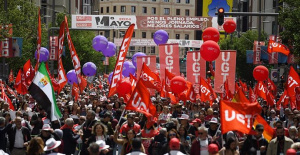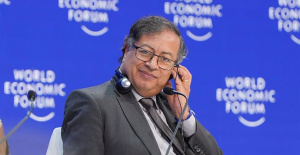This is the first time in the history of the TC that it stops a parliamentary debate in Cortes Generales
MADRID, 19 Dic. (EUROPA PRESS) -
The Plenary of the Constitutional Court (TC) has agreed this Monday to urgently suspend the parliamentary processing, already in the Senate, of the two amendments by which the system of election and arrival of the two candidates to the TC appointed by the Council is modified General of the Judiciary (CGPJ), thus admitting the very precautionary measures requested by the PP in its appeal against said amendments, according to legal sources consulted by Europa Press.
In this way, the magistrates have understood that the progress of the parliamentary procedure causes damage that is difficult to repair to the rights of the 'popular' legislators, who invoked article 23 of the Constitution, which includes the right to political participation of citizens through their representatives.
It is the first time, in its more than 40-year history, that the Constitutional Order urgently suspends a parliamentary debate in the Cortes Generales, so it is an unprecedented decision.
The guarantee court takes this step after said amendments were approved in the Congress of Deputies last Thursday within the framework of the bill to repeal the crime of sedition.
Although these amendments had already passed the parliamentary process in the Lower House, there was still the Senate, where it was expected that they would also be approved next Thursday.
Now, the Secretary of Justice of the Plenary, Alfonso Pérez Camino, will have to personally deliver the decision adopted by the TC to the Upper House, according to the aforementioned sources. MORE THAN 9 HOURS OF INTENSE DEBATE
The eleven magistrates have begun their internal conclave at 10:00 a.m., but the relevant decisions have not arrived until 7:30 p.m., when they have agreed to admit the PP's appeal for processing; also accept the representation requested by United We Can (UP) and PSOE; and to reject the challenges launched by the government parties against the president of the TC, Pedro González-Trevijano, and magistrate Antonio Narváez.
The legal sources detail that the 'popular' appeal has been admitted by 6 votes --those of the conservative majority-- against 5 --those of the progressive minority--; same result with which it has been resolved that it was not the opportune procedural moment to address the challenges formulated by the 'purples' and the socialists.
UP argued that González-Trevijano and Narváez should step aside considering that they have a "direct interest" in paralyzing this reform because they would be replaced by the candidates nominated by the Government -- former Justice Minister Juan Carlos Campo and former Moncloa senior official Laura Díez-- if the proposed modification goes ahead.
The Plenary of the TC already met urgently last Thursday, but then González-Trevijano agreed to postpone it to this Monday after the five progressive magistrates threatened to leave, if they were not given more time to study a matter of great "complexity". " and "relevance" that they had known just 24 hours before. If they had left, they would have prevented the 'quorum' of at least 8 magistrates that is required for the Plenary to be constituted.
The underlying problem is that the Constitutional Court has been waiting since June 12 for the renewal of the four magistrates who make up the third that the Constitution mandates to replace the Government and CGPJ: González-Trevijano and Narváez, appointed in their day by the Executive of Mariano Rajoy; and Juan Antonio Xiol and Santiago Martínez-Vares, appointed at the time by the governing body of the judges.
The legal doubts about the possibility that the two Moncloa candidates could take office without waiting for the two from the CGPJ led to promoting and approving last July in Parliament an express reform of the Organic Law of the Judiciary (LOPJ) to return to the Council his power to appoint his two applicants to the court of guarantees.
However, the negotiations within the CGPJ ran aground on December 2 due to the tacit veto of the conservative bloc to the candidate of their progressive counterparts, the magistrate of the Supreme Court (TS) José Manuel Bandrés, and the latter's refusal to return to fatten his list of applicants (which came to have nine).
In this context, 'morados' and socialists introduced in the bill that eliminates the crime of sedition the two amendments that clear the way for Campo and Díez to take office as TC magistrates without having to wait for the two nominees by the body of government of the judges.
For its part, the CGPJ plans to hold an extraordinary plenary session this Tuesday at 5:00 p.m. where, for now, the only candidates on the agenda are TS magistrates Pablo Lucas and César Tolosa.
The sources consulted by Europa Press already pointed out that, although formally Bandrés was the only formal candidate and the conservative block handled several names, the best positioned to achieve the endorsement of the CGPJ as a whole were Lucas and Tolosa.

 Exploring Cardano: Inner Workings and Advantages of this Cryptocurrency
Exploring Cardano: Inner Workings and Advantages of this Cryptocurrency Seville.- Economy.- Innova.- STSA inaugurates its new painting and sealing hangar in San Pablo, for 18 million
Seville.- Economy.- Innova.- STSA inaugurates its new painting and sealing hangar in San Pablo, for 18 million Innova.- More than 300 volunteers join the Andalucía Compromiso Digital network in one month to facilitate access to ICT
Innova.- More than 300 volunteers join the Andalucía Compromiso Digital network in one month to facilitate access to ICT Innova.-AMP.- Ayesa acquires 51% of Sadiel, which will create new technological engineering products and expand markets
Innova.-AMP.- Ayesa acquires 51% of Sadiel, which will create new technological engineering products and expand markets COMUNICADO: Energy Transitions Commission (ETC) Urges Government and Industry Collaboration to Overcome Perceptions of Offshore Wind
COMUNICADO: Energy Transitions Commission (ETC) Urges Government and Industry Collaboration to Overcome Perceptions of Offshore Wind UGT and CCOO demand the regeneration of democracy, better salaries and a reduction in working hours
UGT and CCOO demand the regeneration of democracy, better salaries and a reduction in working hours Alcaraz gives up his reign in Madrid against Rublev
Alcaraz gives up his reign in Madrid against Rublev Petro announces that Colombia will break diplomatic relations with Israel
Petro announces that Colombia will break diplomatic relations with Israel How Blockchain in being used to shape the future
How Blockchain in being used to shape the future Not just BTC and ETH: Here Are Some More Interesting Coins Worth Focusing on
Not just BTC and ETH: Here Are Some More Interesting Coins Worth Focusing on Ivace and promotes a less invasive device for the early detection of prostate cancer
Ivace and promotes a less invasive device for the early detection of prostate cancer Valencia unanimously approves the ordinance to allocate spaces to test innovative initiatives
Valencia unanimously approves the ordinance to allocate spaces to test innovative initiatives UPV researchers promote a paid master's degree as a "talent factory" in integrated photonics
UPV researchers promote a paid master's degree as a "talent factory" in integrated photonics A spin-off of the UV works on obtaining high-resolution 3D biomedical images in real time
A spin-off of the UV works on obtaining high-resolution 3D biomedical images in real time A million people demonstrate in France against Macron's pension reform
A million people demonstrate in France against Macron's pension reform Russia launches several missiles against "critical infrastructure" in the city of Zaporizhia
Russia launches several missiles against "critical infrastructure" in the city of Zaporizhia A "procession" remembers the dead of the Calabria shipwreck as bodies continue to wash up on the shore
A "procession" remembers the dead of the Calabria shipwreck as bodies continue to wash up on the shore Prison sentences handed down for three prominent Hong Kong pro-democracy activists
Prison sentences handed down for three prominent Hong Kong pro-democracy activists ETH continues to leave trading platforms, Ethereum balance on exchanges lowest in 3 years
ETH continues to leave trading platforms, Ethereum balance on exchanges lowest in 3 years Investors invest $450 million in Consensys, Ethereum incubator now valued at $7 billion
Investors invest $450 million in Consensys, Ethereum incubator now valued at $7 billion Alchemy Integrates Ethereum L2 Product Starknet to Enhance Web3 Scalability at a Price 100x Lower Than L1 Fees
Alchemy Integrates Ethereum L2 Product Starknet to Enhance Web3 Scalability at a Price 100x Lower Than L1 Fees Mining Report: Bitcoin's Electricity Consumption Declines by 25% in Q1 2022
Mining Report: Bitcoin's Electricity Consumption Declines by 25% in Q1 2022 Oil-to-Bitcoin Mining Firm Crusoe Energy Systems Raised $505 Million
Oil-to-Bitcoin Mining Firm Crusoe Energy Systems Raised $505 Million Microbt reveals the latest Bitcoin mining rigs -- Machines produce up to 126 TH/s with custom 5nm chip design
Microbt reveals the latest Bitcoin mining rigs -- Machines produce up to 126 TH/s with custom 5nm chip design Bitcoin's Mining Difficulty Hits a Lifetime High, With More Than 90% of BTC Supply Issued
Bitcoin's Mining Difficulty Hits a Lifetime High, With More Than 90% of BTC Supply Issued The Biggest Movers are Near, EOS, and RUNE during Friday's Selloff
The Biggest Movers are Near, EOS, and RUNE during Friday's Selloff Global Markets Spooked by a Hawkish Fed and Covid, Stocks and Crypto Gain After Musk Buys Twitter
Global Markets Spooked by a Hawkish Fed and Covid, Stocks and Crypto Gain After Musk Buys Twitter Bitso to offset carbon emissions from the Trading Platform's ERC20, ETH, and BTC Transactions
Bitso to offset carbon emissions from the Trading Platform's ERC20, ETH, and BTC Transactions Draftkings Announces 2022 College Hoops NFT Selection for March Madness
Draftkings Announces 2022 College Hoops NFT Selection for March Madness























